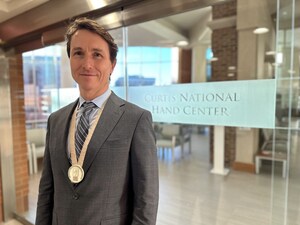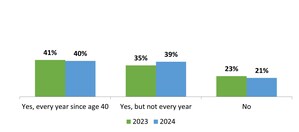MedStar Health Leads $5 Million CDC-Funded Project Aimed at Improving Cancer Survivorship and Reducing Patient Inequities
Washington, D.C., researchers target social determinants of health to decrease racial disparities in cancer outcomes
COLUMBIA, Md., Oct. 25, 2021 /PRNewswire/ -- MedStar Health is leading a $5 million cooperative agreement with the Centers for Disease Control and Prevention (CDC) aimed at improving quality of life for recent cancer patients in Washington, D.C. The project aims to make advances by addressing social needs that disproportionally affect minority communities. Previous research shows that social factors like food insecurity, housing instability, transportation access, financial needs, and racial bias drive up to 80 percent of patient outcomes.
Over the next five years, the study will focus on breast and prostate cancer patients finishing treatment at three Washington, D.C.-based cancer clinics, using strategies to reduce health inequities and improve their outcomes. These strategies include screening patients for social needs ahead of graduation from treatment, engaging with community health workers to connect patients directly to local resources, and holding anti-discrimination training sessions for staff and clinicians.
Researchers hope the project will eventually lead to a permanent and sustainable process for addressing social determinants of health and enhancing cancer care for minoritized communities.
Hannah Arem, Ph.D., is the study's corresponding principal investigator.
"Despite improvements in cancer outcomes over time, significant disparities remain between Black and white cancer survivors," said Arem, scientific director at MedStar Health Research Institute. "We believe the results of this research will play a major role in improving the survivorship of D.C. cancer patients over time as we better understand the burden of social needs in our community and how to support cancer survivors in addressing those needs."
"Once cancer patients finish active treatment, the transition to survivorship can have its own challenges," said Christopher Gallagher, MD, co-investigator on the study and hematologist oncologist at MedStar Washington Hospital Center. "While new treatments and screenings lead to better outcomes, so does access to long-term social services. This study aims to connect patients to the right community resources at the right time to build a successful transition."
MedStar Health is partnering with co-principal investigator Mandi Pratt-Chapman, Ph.D., of George Washington University Cancer Center in addition to researchers at Georgetown University Medical Center and Howard University.
"I am most excited about identifying and changing structural biases across three cancer care centers in the nation's capital," said Pratt-Chapman. "Through our anti-racism task forces, we hope to help reverse entrenched and growing disparities experienced by communities historically excluded from the healthcare system. We will work to resolve root causes of inequity while providing immediate relief to patients and families with significant social needs."
The research also builds on MedStar Health's continued investment into community health, which includes the utilization of the Aunt Bertha Social Care Services Platform. In August, MedStar announced a new software integration that embeds the social needs screening tool directly into patient Electronic Health Records (EHRs). MedStar Health patients enrolled in this study will take advantage of the Aunt Bertha platform to quickly connect with thousands of nearby food banks, rent assistance programs, diaper banks, and more.
"What's so exciting about the community health and Aunt Bertha collaboration is that it enables us to identify community resources more easily for our clients and patients," said Diana Quinn, senior director of Community Health for MedStar Health. "This one-stop shopping approach within the electronic health record is designed such that we simply input a zip code, and it provides us with the names of the resources available in that area. This project will help us better understand which resources are needed for cancer patients specifically."
The study was awarded at the end of Sept. 2021 and will continue through Sept. 2026.
SOURCE MedStar Health

WANT YOUR COMPANY'S NEWS FEATURED ON PRNEWSWIRE.COM?
Newsrooms &
Influencers
Digital Media
Outlets
Journalists
Opted In





Share this article